Aladdin (1992 Disney film)/Characters
Characters from Disney's Aladdin universe.
Original Movie Characters
Aladdin
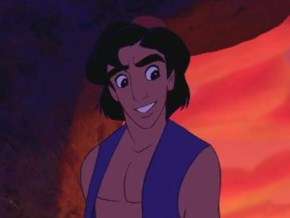
Voiced by: Scott Weinger
- The Ace: Aladdin disguises himself as the completely over-the-top Prince Ali to woo Princess Jasmine, and he's introduced with a preposterously epic song that's one long hymn to his awesomeness, which has him easily evading the guards.
- All of the Other Reindeer: Aladdin normally faced discrimination by people who'd constantly call him a "street rat", and laugh when some haughty prince shoved him into a nearby mud puddle. This had the unfortunate consequence of Aladdin taking this to heart and hating himself enough that he rejects Genie's concerns regarding dropping his own "haughty prince" façade and just telling Jasmine the truth about his identity.
Aladdin: If Jasmine found out I was really some crummy street rat, she'd laugh at me
- Anti-Hero: Earlier on due to growing up as a criminal, he's quite deceitful and has no qualms about stealing from others if he feels like it. In fact, Aladdin may very well be one of the most morally ambiguous Disney protagonists yet. However, not only was every bad deed he committed done for survival rather than out of malice, but he got past this after the second movie.
- Badass Normal: This is a guy who goes up against magical beings, sorcerers, and giant robots on a regular basis, and somehow finds a way to come out on top every time by using his guile.
- Batman Gambit: Showcased in the first movie. His plan to defeat Jafar banked on exploiting the man's ego.
- Beware the Nice Ones: He's a Nice Guy through and through, but you do not want to make him angry. In the first film, when Prince Achmed badmouths him, Aladdin is only stopped from physically attacking him because the palace gates slammed shut between them.
- Bound and Gagged: Chained up and silenced so he couldn't save himself from drowning or call for help, until Genie saves him.
- Character Development: By the final film, he's really grown into a man worthy of being Sultan.
- This is best seen in King of Thieves. After breaking his father out of prison, Aladdin returns to face any punishment he might receive, because he realized how much his running away would affect Jasmine due to his own father's abandonment of his family. Aladdin has learned that his actions affect other people, a lesson some people would say more rulers need to learn.
- Chaste Hero: Although he's engaged to Jasmine and thusly spends a lot of time at the palace, he still seems to live in the abandoned building from the first movie.
- Chick Magnet: Just ask Jasmine, the Harem Girls, Sadira, Saleen, and (initially) Brawnhilda.
- Chronic Hero Syndrome: Especially in the animated show, where characters, often Iago, are able to use the knowledge that he'll always help people in need to get him to go along with things.
- Consummate Liar: Being a Guile Hero Street Urchin, it's part of the trade, but at the same time it's treated as a serious character flaw. Aladdin grows out of it before it becomes an actual Fatal Flaw.
- Dark and Troubled Past: Explored in the television series. He grew up an orphan after his father left the family on a treasure hunt and never came home and his mother died some time afterwards, forcing him to raise himself on the streets as a thief. He later finds out that his dad is the leader of the infamous "40 Thieves." There was also one episode in the series detailing how his childhood friend, Amal, just up and vanished one day without a trace when he was a child.
- Determinator:
- Did You Just Scam Cthulhu?: Twice at least. One of them by conning them into becoming a Cthulhu... who is constrained by itty bitty living space.
- Didn't Think This Through: He used the Genie to become a wealthy prince to woo Jasmine. He succeeds, but never considered before them that with Jasmine comes the throne of Agrabah.
- Dude in Distress: At one point in the first movie, he's thrown into the ocean by Jafar's guards, and would have drowned if not for the Genie.
- In the series, one episode has Aladdin getting kidnapped for ransom by Mozenrath, and Jasmine has to rescue him.
- Friend to All Living Things: He's the only one of the thieves in "Seems Like Old Crimes, Part 1" to treat Abu kindly.
- Guile Hero: He's a roguish street rat who gets by via theft and charm, and uses cunning and trickery to best most conflicts. After first meeting the Genie, Al uses trickery to get out of an otherwise inescapable cave without actually wishing to do so.
- Hidden Depths: He's not called "the diamond in the rough" by the Cave of Wonders for nothing. Aladdin's worth lies far within. When you understand not to judge a book by its cover - the young man is one of the most honest, empathetic and good-willed humans you're ever going to find in the entire world.
- Honor Before Reason: In the third movie; after breaking Cassim out of the dungeon and being discovered, instead of escaping Agrabah with his father, Aladdin refuses to abandon Jasmine and willingly goes back to face the consequences of his actions because he knows how much it would affect her after seeing how much it hurt his mother and him.
- A much milder example can also be seen in the television series. Aladdin lives in his home in the slums and wears the same old peasant rags throughout the series because he doesn't want to mooch off the Sultan. At the time depicted (whenever it's supposed to be anyway) it would be considered improper for him to live in the same house as his girlfriend and not be married, even if it is a huge freaking palace. However, several episodes show that he sometimes sleeps in one of the Palace's rooms, demonstrating that Aladdin seems to alternate between spending nights in his old hovel and spending nights in the Palace.
- Just Like Robin Hood: How often does he actually keep anything he steals for himself? Only a jeweled flower to earn bonus points with his girlfriend.
- Idiot Hero: Even though he's also a Guile Hero, Aladdin is prone to foolish reckless choices: He goes about his life carelessly while making the most moronic decisions, spare for a few moments of flash in the pan brilliance when his or somebody else's life depends on it. It's particularly noticeable when you realize how most of the other characters, save for Jasmine, spend their time trying to steer him to a correct choice. Still, his idiocy seems not to extend too far beyond what's needed for the Aesop of the week. And his moronic behavior goes through stages, as well: in the first movie, it's due to his horrifically low self esteem telling him that lying about himself will make people like him, even when it's obvious that Jasmine loves him for who he is. In the show, it shifts to either overconfidence or his chronic inability to pass by a problem and not try to solve it.
- Leitmotif: Often accompanied by "One Jump Ahead Reprise"
- Losing Your Head: In one episode ("Heads, You Lose") along with Caliph Kapok. Thankfully, Al gets better. By the way, we saw him get nearly decapitated before in The Return of Jafar.
- Loveable Rogue: As a thief and a trickster (at least initially), but a sympathetic one you can root for.
- Mr. Fanservice: Reportedly, he was redesigned during development because originally he was deemed not attractive enough: his animation design was based on Tom Cruise (at the point where Tom Cruise was the hot young thing of the moment) for this very reason. He was originally designed much younger and based on Michael J. Fox, but that design didn't go down as well.
- Must Make Amends: After Aladdin left behind the genie lamp, which led to Iago bringing it to Jafar, then Jafar using it to wish himself to be sultan and the world's most powerful sorcerer.
"I made a mess of everything; somehow I gotta go back and set things right."
- Nice Guy: Aladdin might be a thief and The Trickster, but there is no doubt whatsoever about his decency and sense of morality. In fact, "The Diamond In The Rough" line is essentially a perfect measure about his decency.
- Nice Job Breaking It, Hero:
- He didn't wish the Genie free when he had the chance and left it behind to go talk to Jasmine, giving Iago the opportunity to swipe the lamp and hand it over to Jafar. He even acknowledges that he blew it. Then again, he does fix his mistakes.
- While exploiting Jafar's lust for power to trick him into Becoming the Genie saved the day in the first movie, come The Return of Jafar, when Jafar is unearthed by Abis Mal...
- Nobody Calls Me Chicken: Interestingly, he was originally based on the Trope Namer, Marty McFly, before being redesigned.
- No Social Skills: A mild case, again due to his having grown up on the streets, he often doesn't fit in at the palace. Although he does have a sort of common man's wisdom that impresses the Sultan enough to want to make him his royal advisor.
- Parental Abandonment: His mother died when he was young and Cassim left before that.
- Red Oni, Blue Oni: The red to Mozenrath's blue. Mozenrath is a lot more cold-blooded and calculating, whereas Aladdin has a more impulsive and improvosing nature.
- Rule of Empathy: His defining trait. An Establishing Character Moment happens when he gives up his only meal to ensure orphans won't starve. That's all the viewer needs to know what sort of man he is.
- Save the Villain: Unintentionally. Upon Abis Mal's introduction, the only reason Abis Mal wasn't killed by his own gang for foolishly demanding all the loot that they stole is that Aladdin swooped in and stole it himself from them thus directing all their ire at himself.
- Street Smart: By necessity. "Gotta eat to live, gotta steal to eat".
- Street Urchin: He is one of many children who grew up on the streets of Agrabah. Jafar was all too keen to sacrifice Aladdin for his scheme because in his mind, who would miss one more vanished street rat?
- Turn Out Like His Father: A number of people thought that he would become a "prince of thieves" after his father. Luckily it doesn't go that far.
- Undying Loyalty: To Jasmine. Aladdin would sooner kill himself than cheat on her behind her back. It's why he turned down the advances of Sadira and Saleen in the series. This is further emphasized in the third movie — after freeing his imprisoned father, Aladdin decides to go back to Agrabah because he refused to abandon Jasmine. Also to his other friends, even Iago. He refuses to give up Genie to an old master and he still rescues Abu after their falling out. He even still helps Iago after Iago almost betrays the city by handing over Genie to Abis Mal.
- Walking Shirtless Scene: Apparently, he couldn't afford buttons for his vest. Or a shirt.
- Why Did It Have to Be Snakes?: It turns out that Aladdin is terrified of Unkbut, which are giant spiders that live underground. Justified considering that spiders of that size would be potentially dangerous. He eventually conquers this fear later on.
Genie

Voiced by: Robin Williams/Dan Castellaneta
- Badass Beard
- Benevolent Genie: When Aladdin wished to be a prince, Genie could have just given him a certificate or something. Instead, he got new fancy clothes, a parade, a full musical number, and a grand entrance to impress the princess.
- The Big Guy
- Boisterous Bruiser
- Camp Straight
- The Chew Toy
- Combat Medic
- Deadpan Snarker: When played by Robin Williams.
- Flanderization: An odd case of this being due to different actors. Williams' Genie is a screwwball, but also has a sensitive and reasonable side, sometimes acting as a sort of father figure to Aladdin (particularly in King of Thieves). When Castellanata plays him, this almost completely vanishes, and his hyperactive goofiness is played up much more.
- Forgot About His Powers: Due to how powerful he is, he has a bad case of this in the series.
- And whenever he didn't forget, he had an unfortunate tendency of running into villains with Anti-Magic abilities or otherwise have a similar power level.
- Four-Fingered Hands
- Fourth Wall Observer
- Genie in a Bottle: Until the end of the first film.
- Gentle Giant
- Great Gazoo
- Large Ham
- Let's Get Dangerous
- Leitmotif: The "To Be Free" theme. In his more humorous moments he's also accompanied by the refrain from "Friend Like Me."
- The Nicknamer
- Our Genies Are Different: For the most part, Genie was consistent with how the 20th century Western world viewed genies, although he had a few new twists. He was one of the first genies to want to be set free, and the first genie that could not kill.
- It may not have been Disneyfication so much as the the writers were simply Nerfing a potential deus ex machina outright.
- Reality Warper
- Why Did It Have to Be a Mukhtar?
Jasmine

Voiced by: Linda Larkin
- Action Girl: Not so much in the movies, but very much so in the series. There she often helps Aladdin beat the bad guy of the week, and in several episodes, she does it by herself.
- In "Sandswitch", Jasmine is given memories of a life as a street rat. The new Jasmine is introduced effortlessly beating up four of the royal guards to rescue Abu, Iago, and Rajah.
- In "Forget Me Lots", Jasmine's memory is removed and she's told that she is Harmless Villain Abis Mal's daughter, and one of the most evil and feared people in the area. This causes her to instantly become a marvelous Dark Action Girl who takes over the palace almost singlehandedly, then gives herself a Klingon Promotion when she realizes how useless Abis Mal is.
- In "The Wind Jackals of Mozenrath", Jasmine dons her Dark Action Girl attire again when she, Aladdin, and Abu infiltrate Mozenrath's kingdom to steal an unearthed magical weapon.
- In "Eye of the Beholder", Jasmine is turned into a naga. Even though she's horrified of her snake tail, she puts it to very good use a few times on the way to find a cure.
- In "A Sultan Worth His Salt", Jasmine receives warrior training after being kidnapped by a group of Amazons.
- Bare Your Midriff: She currently provides the page image
- Beware the Nice Ones: Firstly: She's sweet, caring and pure-hearted, but it is not wise to make her angry at you. Secondly: Underestimating her is a very bad idea. Villains and non-villains alike, including Aladdin, always learn this the hard way. Case in point, when Jafar leads everyone to believe that he had Aladdin executed, Jasmine all but says that her first act as queen will be to have Jafar executed.
Jasmine: "At least some good will come out of my being forced to marry. When I am queen, I will have the power to get rid of you!"
- Damsel in Distress: She is trapped in an hourglass slowly filling with sand during the final battle of the first film and nearly drowns in it until Aladdin breaks her out.
- Defrosting Ice Queen: In the original film, she's initially as impressed with "Prince Ali" as she is with all her other suitors (that is, not at all). However, Aladdin taking her on a magic carpet ride around the world in "A Whole New World" helps her to loosen up a little and be friendlier, and her defrosting concludes when she deduces that "Prince Ali" is actually "the boy from the market", whom she fell in love with earlier.
- Evil Costume Switch: Her "Scourge of the Desert" costume in Forget Me Lots.
- Go-Go Enslavement: Jafar makes Princess Jasmine wear a red harem outfit, although her normal clothes don't cover much more; they're just blue. Once he's defeated they turn back, confirming they were magical in nature.
- Graceful Ladies Like Purple: She wears a purple dress when she intends to announce her engagement.
- Hotter and Sexier: The original Aladdin movie has an in-universe example when Jafar puts Jasmine in Go-Go Enslavement clothes. It cuts lower at cleavage and crotch (and higher under her cleavage!) to emphasize this.
- Hypnotize the Princess: Invokes this trope as part of We Need a Distraction. However, this actually happens to her for real in the TV show episodes "I Never Mechanism I Didn't Like" and "While the City Snoozes." She's also a Criminal Amnesiac in "Forget Me Lots."
- I Just Want to Be Free: Although after the first attempt ending so disastrously (and then shortly meeting Ali after), she stops trying. In the series though, she has far more freedom than before and goes with Aladdin on his adventures. She still wants freedom but is more smart about it.
- Impossible Hourglass Figure: Along with Ariel, she has the most exaggerated figure of any Disney Princess or heroine.
- Kindhearted Cat Lover: She's a sweet, caring princess whose best friend is a tiger.
- Lady of War: She's shown to be a capable fighter despite her demure and graceful manner. This is especially shown in Aladdin and the King of Thieves, when she is fighting some of the thieves and even pushed a heavy statue on them in the climax.
- Leitmotif: Heard prominently about twenty seconds into "Jasmine Runs Away."
- Letting Her Hair Down: She is shown with her hair down after the "Whole New World" sequence where she and Aladdin have fallen in love, and she's truly happy for the first time in the film.
- Marry for Love: If she's gotta get married, it better be to the guy she wants!
- Morality Pet: Downplayed to Aladdin. He was already a nice guy way before they met, and despite his thieving and lying ways, he had a strong moral code. That being said, Aladdin still had some trouble truly reforming his criminal ways, with Jasmine being his primary motivation in bettering himself.
- Ms. Fanservice: Arguably the most sexual of all the Disney Princesses, especially in her red slave suit. This in spite of the fact that she's 15 going on 16 in the film. Plus, she is the first (human) princess that wears a Bare Your Midriff outfit.
- Nice Girl: Jasmine is extremely compassionate and caring whether towards her kingdom, her family, her friends, and especially Aladdin, whom she treats as a best friend, as well as a lover.
- Plucky Girl: Among other things, she managed to sneak out of the palace and openly stood up to Jafar.
- Rebellious Princess: Not only does she not want to get married, she also doesn't enjoy the confinements of palace life—therefore she is the most quintessential example in the line.
- Runaway Fiance:
- She runs away from home to avoid being married off against her will.
- Also her suitors run away from her, since Jasmine wasn't interested in marrying for anything but love, hence the reason she starts hooking up with Aladdin. He was what she was looking for in a husband, a kind man who treated her as a person rather than an object for political gain.
- Show Some Leg: The only Disney Princess who tries to bait the villain with her affections. It almost worked, if not for the reflection of the tiara she wore.
- Single Woman Seeks Good Man: Doesn't give one flying rat's ass about all the rich, snobby princes trying to woo her, and instead goes for the poor but good-hearted Aladdin. He treats her like a real person rather than an object for political gain as other suitors had done before. The whole film gives the message of Be Yourself.
- Spoiled Sweet: Her life is especially shown to be grand and sumptuous. In the animated series, she tends to try to use her status as Princess of Agrabah to bark orders at villains. It never works. Despite her privileged upbringing, she has a good heart and genuinely wants to help people. She even falls in love with Aladdin, a poor thief, and never is bothered by his lower status.
- Stripperiffic: Jasmine's regular outfit is pretty revealing, but her slave outfit manages to be even more so.
- Took a Level in Badass: Jasmine was noticeably more of an Action Girl in the final sequel, Aladdin and the King of Thieves, than she was in the two preceding films. She holds her own against the Forty Thieves, all of which are at least twice her size.
- Tsundere: More sweet than harsh; Jasmine is a sunny and friendly person overall, but she won't hesitate to tell those who appear interested in her only for her beauty and kingdom exactly what she thinks of them.
- Well, Excuse Me, Princess!: Due to her frustration of being ordered around, she's quick to deflate Aladdin's feigned pomposity while he's in his prince disguise and her frustration reaches a boiling point when she tells him to go jump off a balcony. However, when he says something afterwards that helps with confirming her suspicions about him being the boy from the market that she fell in love with, her tone immediately changes to worry once he goes through it (don't worry, Carpet was there to catch him).
Jasmine (while talking to Aladdin about palace life): "You're not free to make your own choices"
(later, on the balcony)
Aladdin: You're not just some prize to be won. You should be free to make your own choice. I'll go now."
Abu

Voiced by: Frank Welker
- Anti-Hero: Type II. Noticeably more selfish than Aladdin, and continues to be exceedingly sneaky even into the sequels.
- Well, he is a monkey. They don't share easily.
- Big Eater
- Empathy Pet
- Everything's Better with Monkeys
- The Lancer
- Loveable Rogue
- Master of Unlocking
- Misplaced Wildlife: A new world monkey in the Middle East?
- Prehensile Tail
- Silent Snarker: From time to time. Just look at his expression in the above pic!
- Speech-Impaired Animal
- Sticky Fingers
- Vitriolic Best Buds: With Iago.
Iago

Voiced by: Gilbert Gottfried
- Anti-Villain --> Anti-Hero: Even in the first movie, he's clearly the lesser of evils in comparison to Jafar. Return of Jafar has him alternate between Face Heel Turns and Heel Face Turns, but eventually settles on a status that is (albeit barely) in the general direction of good, which carries over into the third movie.
- Butt Monkey: The movie writers' mantra: "When in doubt, hurt the bird."
- Changed My Mind, Kid: In The Return of Jafar.
- Deadpan Snarker
- Dirty Coward --> Cowardly Lion
- The Drag Along: In the series.
- Feather Fingers
- Greed
- Heel Face Turn
- The Imp
- Jerk with a Heart of Gold
- Misplaced Wildlife: He's a South American parrot in the Middle East.
- Although Jafar implies to have traveled a lot, so who knows, maybe he's been to South America.
- Mr. Exposition: When need be, does this, especially when recounting his past with Jafar in the TV series, generally doing so to add context to the Monster of the Week or Artifact of Doom if applicable.
- No Indoor Voice: What did you expect from Gilbert Gottfried?
- Polly Wants a Microphone
- Sixth Ranger
- Snarky Non-Human Sidekick: Especiall after his Heel Face Turn
- Stationary Wings
- Tiny Guy, Huge Girl: Tiny Guy to Thundra's Huge Girl.
- Toothy Bird
- Vitriolic Best Buds: He is like this with the rest of the team in the series, though he gets especially close (and insultive) to Abu.
- Voice Changeling: His specialty.
- Wild Card
Carpet
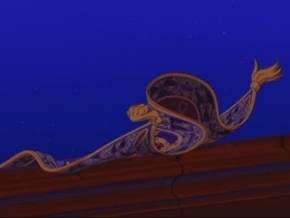
- Animate Inanimate Object
- Bash Brothers: He and Genie work particularly well together and have known each other for a very long time.
- Big Damn Heroes: Often catches the heroes mid-air.
- Don't Touch It, You Idiot!: To Abu in the movie.
- Face Palm: Manages to do this without a face or a palm.
- Just a Carpet: He doesn't like being treated as just a piece of decoration, but who would?
- Leitmotif: Yes, even the Carpet gets one. You can hear a soft variation of it when they first meet Carpet, followed by a bombastic version during the escape from the cave. It returns as Aladdin and Abu escape the ends of the earth later on.
- Magic Carpet: Duh!
- Running Gag: Constantly besting Genie at various games.
- Silent Snarker
- The Smart Guy
- The Speechless
- Weaksauce Weakness: He can be beaten by particularly heavy piece of furniture, or someone with a knowledge of basic knots.
Sultan
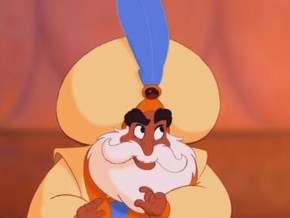
Voiced by: Douglas Seale
- Adipose Rex
- Adult Child
- Badass Grandpa: For the most past, averted... though in some episodes of the series he shows definite traces of this.
- Bumbling Dad
- Crouching Moron, Hidden Badass
- Horrible Judge of Character: The Trope Namer!
- Leitmotif: A cute li'l Fanfare.
- Miniature Senior Citizens: Although he wasn't any taller when he was younger either.
- No Name Given: Although the lyrics for the unused reprises for Arabian Nights reveal that his name is Hamed. Also, in one episode of the series, the ghost of his grandfather calls him "Bobo".
- Papa Wolf
- Reasonable Authority Figure
Rajah
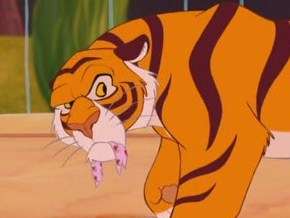
Voiced by: Frank Welker
- All Animals Are Dogs: He acts like a (very tough) housecat.
- Cool Pet
- Cute Kitten: Turned into one by Jafar (temporarily) in the first movie.
- Demoted to Extra: In the TV Series.
- Panthera Awesome
- Undying Loyalty: For Jasmine.
Jafar

Voiced by: Jonathan Freeman
- Ambition Is Evil
- Ax Crazy: He looks calm and cold-blooded at first, but once he obtains the Lamp's power he loses all his coolness, revealing his true psychopathic nature.
- Beard of Evil
- Becoming the Genie
- Big Bad: Of the first two films.
- Charm Person
- Color Coded for Your Convenience: Dressed in villainous black and red.
- Creepy Long Fingers
- Dark Is Evil
- Evil Tropes
- Evil Brit
- Evil Chancellor
- Evil Counterpart: To the Genie after he's transformed into a genie.
- Evil Eyebrows
- Evil Laugh: One of the greats.
- Evil Sorcerer
- Family-Unfriendly Death: He convulses in agony while his skeleton appears in flashes of light in a manner not dissimilar to how electrocution is portrayed.
- Faux Affably Evil: Begins as composed, polite and stoic, but gradually reveals the true monster behind the act.
- Fisher King
- From Nobody to Nightmare: Multiple times. He starts as a Smug Snake, then he becomes an Evil Sorcerer, then he becomes a Physical God. In Return of Jafar he doesn't get any stronger, but he definitely gets smarter.
- A God Am I
"THE POWER... THE ABSOLUTE POWEEEERRR!!! THE UNIVERSE IS MIIIINE TO COMMAND, TO CONTROOOOOLLL!!!"
- Hypno Ray
- Jackass Genie/Sealed Evil in a Can: In Return of Jafar.
- Jerkass: He is this to Abis Mal in Return of Jafar.
- Large and In Charge: Iago's words about him in Return of Jafar.
- Large Ham: One of Disney's largest.
- Lean and Mean
- Leitmotif: A dramatic, descending piece that sounds a bit like "Arabian Nights."
- Loophole Abuse: Genies can't kill anyone, but in Return of Jafar there's nothing stopping him from setting up people to be die indirectly, say, by leaving them dangling from a rock over a pit of lava.
- Manipulative Bastard
- Names to Run Away From Really Fast
- Obviously Evil: To everyone but the Sultan, who is a Horrible Judge of Character.
- Ominous Opera Cape
- One-Winged Angel: In addition to the Scaled Up mentioned below, he turns into a Genie. While it doesn't work for him at the time and he becomes Sealed Evil in a Can, he proves in the sequel he's far more powerful than before.
- Pride
- Sanity Slippage: After he becomes a sorcerer, he goes a little bit nuts. It only gets worse in The Sequel.
- Scaled Up: Turns into a gigantic cobra. Worth noting, this is one of the few times its actually effective.
- Smug Snake: Initially...
- ...but he graduates to a Magnificent Bastard in Return of Jafar
- Villain Ball
- Villain Song: Prince Ali Reprise in the first film and You're Only Second Rate in the second one. He also had three cut songs from the first movie, Why Me?, Humiliate The Boy, and My Finest Hour.
- Wicked Cultured
- Would Hit a Girl: Even though he doesn't get to the point due to deciding that forcing her to become his love slave via Genie would be much better, Jafar was about to seriously backhand Jasmine when she tossed the wine in his face.
- X-Ray Sparks
Razoul

Voiced by: Jim Cummings
- Badass Beard
- Butt Monkey
- Chained Heat: With Aladdin in the TV finale. Even better, it was a magic chain. If the got along, it was long, disagreeing, short, and if they started fighting the shackles fused together.
- The Dragon: To Jafar, even though...
- Hero Antagonist: He's only doing his job.
- Jerk with a Heart of Gold: He dislikes Aladdin, but eventually lightens up on him.
- Surrounded by Idiots: The other guards aren't very bright.
- Unwitting Pawn: To Jafar in both movies, some occasions in the TV series, and to Sa'luk in King Of Thieves.
Sequel/Series Characters
Abis Mal

Voiced by: Jason Alexander
- Bad Boss
- Beard of Evil
- Butt Monkey
- Fat Bastard/Fat Idiot
- Glad I Thought of It
- Identical Grandson: Of Abnor Mal.
- Ineffectual Sympathetic Villain: It's not that he isn't a threat, but his own stupidity usually ends up causing his plans to backfire on him.
- Nice Hat: He's obsessed with them!
- Not-So-Harmless Villain: Even if they are few, he does have his moments.
- Punny Name: Cringeworthy.
- Small Name, Big Ego
- You Have Failed Me...: It's said in one early episode that he beheads those who fail him. Haroud warns him about doing this, but to no avail, as it tends to just be the two of them after that.
Cassim
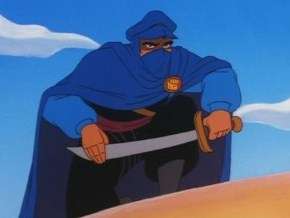
Voiced by: John Rhys-Davies
- Anti-Villain Type II.
- Badass Arm-Fold: One of his standard poses.
- Badass Beard
- Badass Long Robe
- Badass Normal
- Cool Old Guy
- Disappeared Dad
- Face Heel Revolving Door: He turns out all right at the end.
- Hot Dad
- In the Hood
- Never Hurt an Innocent
- Noble Demon
- Papa Wolf
"Don't touch my son!"
Sa'luk
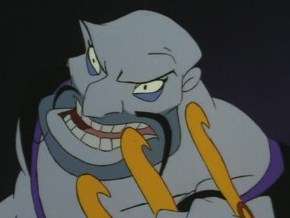
Voiced by: Jerry Orbach
- Asskicking Equals Authority
- Ax Crazy
- Badass Mustache
- Badass Normal
- Bald of Evil
- Big Bad: Of the third film.
- Disney Death: Quite surprising, as it first seemed like a typical Disney Villain Death.
- He got one of those later.
- Genius Bruiser: A lot more sneaky and manipulative than he first seems.
- Large and In Charge: After turning the other thieves against Cassim. It's also hinted that he used to be the leader before Cassim.
- Manipulative Bastard
- The Resenter: Hates Cassim with a passion.
- The Starscream
- Taken for Gold
- Villain Song: Are You In Or Out?
- Walking Shirtless Scene
- Wolverine Claws
The Oracle
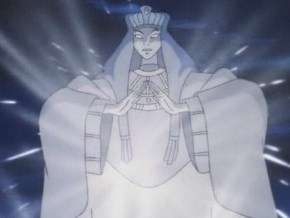
Voiced by: C.C.H. Pounder
Haroud Hazi Bin

Voiced by: James Avery
- Affably Evil
- Beleaguered Assistant
- Black Best Friend: Well, the closest Abis Mal has to a friend, anyway.
- Brilliant but Lazy: Why do all the hard work yourself when you can trick your boss into doing it?
- Dangerously Genre Savvy
- Deadpan Snarker
- Face Palm
- Know When to Fold'Em
- Lean and Mean: In contrast to his boss.
- Punny Name: Really?! Haroud Hazi Bin and Abis Mal
- Servile Snarker
- Straight Man
Amin Damoola

Voiced by: Jeff Bennett
"Don't call me Butterfingers!"
"I'm alright."
- The Chew Toy
- Ineffectual Sympathetic Villain: Even Mozenrath expressed some pity for him.
- Iron Butt Monkey
- The Klutz
- Nice Job Fixing It, Villain: Turning into a Gryphon allowed the heroes to undo the curse on the Sultan.
- Not-So-Harmless Villain: Once he got his hands on the Five Fingers of Discount, as well as when he started working for Mozenrath.
- One-Winged Angel: In the form of a Gryphon.
- Punny Name: As is standard for the animated series.
- Who's Laughing Now?
Mechanikles

Voiced by: Charlie Adler
- Ancient Grome
- Animal Motifs: He has a big insect-theme going on with his robots.
- Beard of Evil
- Beware the Silly Ones
- Clock King
- Ditzy Genius
- Evil Genius
"The Greatest of the Great Greek Geniuses!"
- Evil Laugh: He usually starts coughing in the middle of it.
- High-Class Glass: It's actually some sort of microscope.
- Humongous Mecha: He builds 'em.
- Large Ham
- Laughably Evil
- Mad Scientist
- Neat Freak
- Robot Master
- Spell My Name with an "S": As there is no official word on how to spell his name, several different spellings are used by fans.
- Super OCD: He lists everything, no matter how trivial, on a schedule.
- Villain Exit Stage Left
Sadira

Voiced by: Kellie Martin
- Anti-Villain: Type I or II.
- Badass Adorable
- Badass Long Robe: On occasion.
- Batman Gambit: After being framed by the Sand Witches she pretends to join them in order to stop them.
- The Cameo: At Aladdin's wedding.
- Cute Witch
- Dark Magical Girl
- Dishing Out Dirt
- Distaff Counterpart: To Aladdin. Their similarities is actually part of why she felt they belonged together.
- Does Not Like Shoes: Like Aladdin, she too usually goes barefoot.
- Lethal Chef
- Loveable Rogue
- Pimped-Out Dress: During her princess-fantasy.
- Reformed but Rejected: It doesn't last, though.
- Stalker with a Crush
- Wild Card
- Woobie, Destroyer of Worlds: Especially by her last appearance.
Mozenrath
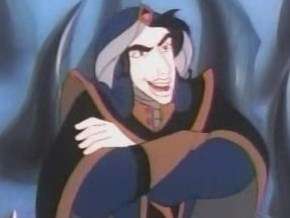
Voiced by: Jonathan Brandis
- Artifact of Death: His gauntlet, the source of his power.
- Badass Bookworm
- Badass Long Robe
- Bastard Understudy: The little backstory that is known about him basically boils down to overthrowing Destane and taking his power for himself.
- The Chessmaster: While he is fairly good at making plans, Aladdin and his friends are just as good at foiling them. He spends one episode just sitting on his throne, and it still doesn't end in a complete loss for him.
- Chronic Backstabbing Disorder
"Is it my fault that you are so trusting?"
- Classic Villain: Pride and Envy.
- Dangerously Genre Savvy: He knows how to manipulate Aladdin to do his dirty work for him, that a hero makes a better hostage than a princess, and the convenience of Anti-Magic, to name a few.
- Deadpan Snarker: He dishes out snark as often as magic.
"You were in my kingdom and you didn't look me up? I'm hurt."
- He even manages to snark when he's Chewing the Scenery:
"Oh, should I tremble at the painted toes of her dainty little feet?! I don't think so!"
- Determinator: His refusal to give up rivals that of Aladdin.
"When I want something, I get it."
- Dishing Out Dirt: Sort of. Using the Black Sand is one of his powers.
- Evil Counterpart: Towards Aladdin.
- Evil Genius: Though he mostly relies on his gauntlet, he's no stranger to creating his own magical tools, or to the knowledge of how to acquire more devastating magical weapons.
- Evil Sorcerer
- Fascinating Eyebrow
- Faux Affably Evil: He's a ruthless, yet charming young man who only cares about gaining power.
- Foe Yay: Half the time with Jasmine, all the time with Aladdin.
- Green-Eyed Monster
- Ink Suit Actor: A lot of his character came from the studio's interpretations when studying Jonathan's appearance and movements.
- Knight of Cerebus
- Lack of Empathy
Aladdin: A test? People could've been hurt!
Mozenrath: ...And your point would be?
- Large Ham: Not to the same degree as most of the others, but it's there.
- Manipulative Bastard
- Mysterious Past
- Names to Run Away From Really Fast
- Narcissist
- Eucatastrophe
- Necromancer
- The Only One Allowed to Defeat You
- Pretty Boy: A slender face, curly hair, lean figure, full and pouty lips... he's a pretty man.
- Psychotic Smirk
- Raven Hair, Ivory Skin
- Red Oni, Blue Oni: The blue to Aladdin's red.
- Red Right Hand: Or in his case, Skeletal Right Hand, which his gauntlet may or may not have been responsible for.
- The Resenter: Not only does he want revenge, but Aladdin is just the kind of person Mozenrath would hate anyway.
- Soft-Spoken Sadist
- Sophisticated As Hell: Being a young guy with Sesquipedalian Loquaciousness tendencies, it's to be expected.
- Sorcerous Overlord
- Squishy Wizard: In this case it's interestingly enough the usage of magic itself that makes his body weak.
- Tall, Dark and Snarky
- Teen Genius: Is said to be around the same age as Aladdin.
- Wicked Cultured: A very young case.
- What Could Have Been: The third movie was originally going to be about him and Aladdin discovering that they are brothers. However, it was decided that references to the TV series were better avoided.
- Word of Dante: Everything you think you know about Mozenrath's backstory. See the Trivia tab.
- Xanatos Gambit: He sets one up in his debut episode. Either he will gain control over a magic-devouring beast, or Genie will be gone. Either outcome would leave Agrabah powerless against him.
- Your Days Are Numbered: And apparently very few left.
Xerxes
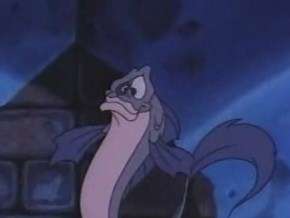
Voiced by: Frank Welker
- Butt Monkey
- Evil Counterpart: Towards Abu and Iago.
- Flying Seafood Special
- Hulk Speak
- The Igor
- Not So Different: From Iago.
Genie: Agrabah has a strict ordinance against evil flying critters." (to Iago) "You've got your tags, don'cha?
Destane
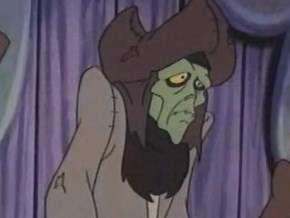
Iago: Even Jafar steered clear of that guy.
- One-Scene Wonder: He became quite memorable, considering he only had a few seconds of screen-time, as well as no lines.
- Reforged Into a Minion
- Sorcerous Overlord: Or, he used to be.
Mirage

Voiced by: Bebe Neuwirth
- Badbutt: She mostly stays out of any direct confrontation with the heroes, since the things an incarnation of all evil would do to her enemies in a battle probably wouldn't be very kid-friendly.
- Bare Your Midriff
- Beast Woman
- Card-Carrying Villainess
- Cats Are Mean
- Evil Cannot Comprehend Good
- Femme Fatalons
- For the Evulz
- Impossible Hourglass Figure
- Large Ham
- Made of Evil
- Manipulative Bitch
- Names to Run Away From Really Fast
- Noodle Incident / What Happened to the Mouse?: As part of her mysterious past. At the end of "Eye Of The Beholder" Fasir briefly implies that he and her had some kind of romantic relationship, before something twisted her to evil. This is never brought up again.
- Psycho Ex-Girlfriend: It's implied in the episode Eye of the Beholder that she and Fasir were once lovers, though it's never elaborated on.
- Smug Snake
- Trrrilling Rrrs
Chaos
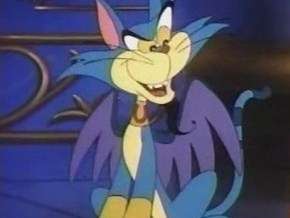
Voiced by: Matt Frewer
- Allergic to Routine
- Batman Gambit: He tricks Mirage into saving Agrabah, to teach her a lesson about trying to trick him.
- Beware the Nice Ones
- Cats Are Snarkers
- Great Gazoo
- Large Ham
- Noble Demon
- Obfuscating Stupidity
- Reality Warper
- The Trickster
Arbutus
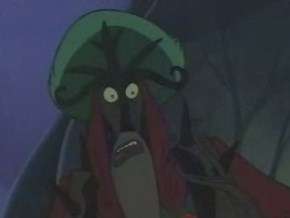
Voiced by: Ron Perlman
- Anti-Villain: He's probably the least evil of the series villains (not the least effective, Abis Mal is that, but the least malicious) since he's only collecting a debt from the Sultan and doesn't hurt any of the characters before they hurt him.
Jasmine: "Arbutus, I'm not a flower you can keep in your garden! I need my family and friends."
Arbutus: "Ah, yes, human needs. Like you need to hack down my gorgeous trees, and chop them into lumber."
Jasmine: "It's not that simple."
Arbutus: "Indeed! You burn them, for warmth. Creating smoke, to block our life-giving sun!"
Jasmine: "We don't do that on purpose!"
Arbutus: "Is it an accident when you rip and pluck my flowers? Condemning them to a slow death in a vase?"
Jasmine: "Slow death?"
Arbutus: "Your kind, you're all the same! You treat my beautiful living creations as things! Why should I treat you any differently?"
Jasmine: "Arbutus, I... I think I understand."
"Your sword may sever every limb, but my power will always bloom!"
- Beard of Evil
- Blue and Orange Morality: Being a plant and all.
- Expy: Looks a lot like a plant-Jafar.
- Gaia's Vengeance
- Humans Are the Real Monsters
- Large Ham
- Mad Artist
- Nature Spirit
- Papa Wolf: He loves his plants as much as Aladdin and the sultan loves Jasmine.
- Whole-Plot Reference: Arguably, his episode is a variation on the original story of Beauty and the Beast; a man is caught stealing flowers from a magical creature and the creature claims his daughter as payment. And even though Jasmine didn't fall in love with Arbutus, she still had pity for him and tried to stop him and Aladdin from fighting.
Mukhtar
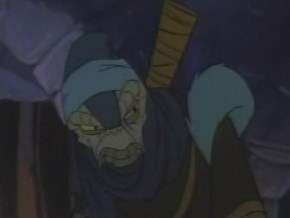
Voiced by: John Kassir
- Badass
- Badass Cape
- Changed My Mind, Kid: At the end of The Hunted.
- Foil: More or less Genie's complete opposite.
- Genie Hunter
- Heel Face Turn
- Hidden Heart of Gold
- Last of His Kind
- Lightning Bruiser
- Lizard Folk
- No Name Given: "Mukhtar" is the name of his species and he is only ever referred to as such, much like Genie is only ever referred to as Genie.
- Punch Clock Villain: Just tries to make a living, doing what he does best.
- Scarily Competent Tracker
- Sssssnaketalk
- Where Does He Get All Those Wonderful Toys?: And for that matter, what are they?
Fasir
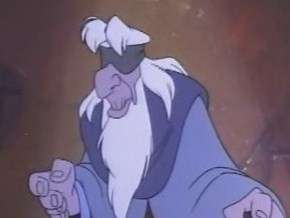
Voiced by: Ed Gilbert
- Ambiguously Human
- Big Good
- Blind Seer: His blindness could be a facade to hide his cyclopic eye, though.
- Cain and Abel: With his brother Fashum.
- The Chessmaster: A heroic example.
- Cool Old Guy
- Creepy Monotone
- Cyclops
- Dark Is Not Evil: He starts out rather ambiguous about which side he's on, especially when revealed to be a cyclops.
- Herald
- Manipulative Bastard: Occasionally, but it's with good intentions.
- My Species Doth Protest Too Much
- Mysterious Past
- Noodle Incident / What Happened to the Mouse?: As part of his mysterious past. At the end of "Eye Of The Beholder" Fasir briefly implies that he and Mirage had some kind of romantic relationship, before something twisted her to evil. This is never brought up again.
- Simple Staff
- Stealth Hi Bye
- Wizard Beard
- You Can't Fight Fate: Doubly Subverted. As he says himself, appearances can be deceiving.
Nasira
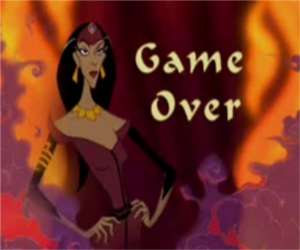
Voiced by: Jodi Benson
- Avenging the Villain: She's Jafar's sister (as if the image didn't make that obvious) and she's there to avenge him.
- Game Over Woman
- Gender Bender: A meta example; see Mythology Gag below.
- Lean and Mean
- Mythology Gag: Possibly; in the original Aladdin legend, there were two evil sorcerers, the second being the vengeful brother of the first one. While Jafar was basically a Composite Character of the two of them, Nasira brings back the basic idea.
- Scaled Up: Nasira doesn't need to transform into a cobra. She already looks like one.
- Smug Snake
- Wicked Witch: Razoul's words about her.
Saleen
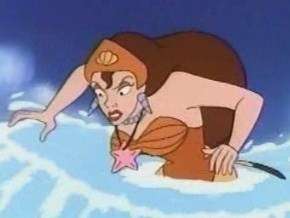
Voiced by: Julie Brown
- Alpha Bitch: She certainly has the attitude.
- Bitch in Sheep's Clothing
- Evil Redhead
- Expy: Of Ariel, almost seems like an intentional in-joke of the writers.
- Making a Splash
- Our Mermaids Are Different: She can actually walk on land by splitting her fins.
- Smug Snake
- Stalker with a Crush: To Aladdin. Even crazier than Sadira.
- Vain Sorceress
- Wicked Witch: Yes, she is one despite being a...
Eden
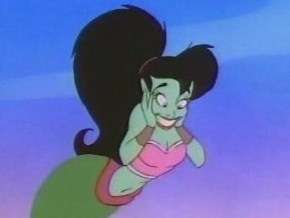
Voiced by: Debi Derryberry
- Badass Adorable
- Bare Your Midriff
- Benevolent Genie: To her master Dhandi.
- Literal Genie: To Abis Mal.
- Cool Big Sis: For Dhandi.
- Genki Girl
- Love Interest: For Genie.
- Reality Warper
- Violently Protective Girlfriend
Thundra
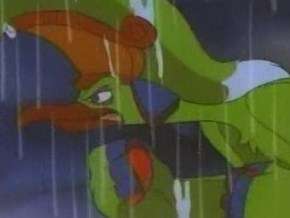
Voiced by: Candi Milo
- Beware the Nice Ones
- Elemental Powers
- Gratuitous Spanish
- Tiny Guy, Huge Girl: Huge Girl to Iago's Tiny Guy.
- Toothy Bird
- Woman Scorned
Malcho
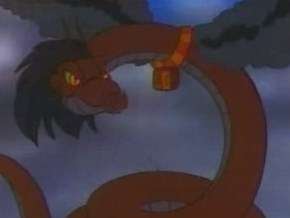
Voiced by: Hector Elizondo
- Affably Evil: Possibly the best example from the series.
- Bad Boss: Played with when Iago becomes his sidekick.
"Maybe if a scheme fails I can slap you around a bit? Yes, please?"
- Brought Down to Badass: Even after losing his powers he's still a formidable enemy.
- Elemental Powers
- Evil Counterpart: Of Thundra.
- Gratuitous Spanish
- Kill It with Ice/Kill It with Fire: He survives both attempts.
- Large Ham
- Mix-and-Match Critters: He's a giant snake with wings... and hair.
- Revenge: Against Iago, then to Aladdin.
- Third Person Person
- Wild Hair
Minos, Fatima & Aziz

Voiced by: Keith David, Charity James & Michael Bell
- Badass Abnormal
- Break the Haughty: Fatima.
- Breath Weapon: Aziz.
- Dark Action Girl: Fatima.
- Darkskinned Blonde: Fatima.
- Extreme Omnivore: Aziz.
- Femme Fatale: Fatima.
- Heel Face Turn: Minos and Fatima.
- I Am a Monster/I Just Want to Be Normal: Fatima.
- Large and In Charge: Minos.
- Master of Unlocking: Aziz.
- Morality Pet: Fatima is this for Minos.
- Never My Fault: They blame Aladdin for what became of them.
- Scary Black Man: Minos.
- Terrible Trio
- Walking Shirtless Scene: Minos and Aziz.